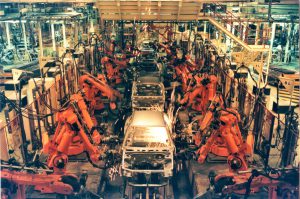


Given the breakneck pace of improvements in automation and artificial intelligence, fears about job loss and human obsolescence continue to consume the cultural imagination. The question looms: What is the future of human work in a technological age?
Innovators such as Elon Musk and Bill Gates have done their share to affirm the predominant pessimism, painting a grim picture of a future defined by robot overlords and diminishing human contributions. “At least when there’s an evil dictator, that human is going to die,” Musk recently observed. “But for an AI, there will be no death — it would live forever.”
The most recent strides and achievements in artificial intelligence are certainly unique in the scope of human history. But as it relates to their impact on the future of human work, the questions have less to do with robotic genius than they do with our faith in human creativity.
In a short film from Freethink, we get a helpful reminder of the historical record. Despite the immediate pain and suffering caused by the various waves of automation and creative destruction, we have yet to see an overall reduction in our opportunities for work and creative service.
“If you think about it,” the narrator explains, “most of the great inventions of the past 200 years have been designed, explicitly, to take our jobs, and yet the fraction of people in the workforce is near an all-time high.”
As for whether this time is markedly different from the rest, once again, the question has to do with whether the depths of human creativity have markedly shallowed. If we only imagine the ongoing developments in robotics, humans will surely e the victim. But as those innovations unfold, we should be careful that we don’t dismiss or disregard the creative developments we’re bound to see from human minds and human hands.
“Whenever a new technology arrives, we can easily see what jobs it might replace. The problem is that we’re really, really bad at envisioning what kind of new jobs might be born in the future,” the narrator explains. “…The idea is that when we passed off some of the workload to machines it broadened the scope of what was possible. We came up with new ideas, new innovations, and new kinds of work.”
Using the example of the ATM — which, despite the popular fears, led to anincrease in bank-teller jobs, as well as higher wages and expanded responsibilities — the film reminds us of the mysteries of the unforeseen, and the continuous surprises of human capacity when machines gives us room to dream and imagine.
“All of these new technologies transformed the way we work, and adjusting to them wasn’t simple, costless, or immediate,” the narrator concludes. “But if the past is any indication, this radical leap forward in technology is just as likely to create jobs as it is to destroy them.”
Even still, much of this depends on our perspectives and cultural imaginations—particularly how we view the human person and his/her relationship to society and civilization.
As Kevin J. Brown recently wrote, much of modern society views the world through a “chaos narrative,” in which “beings that reproduce with superior qualities will outpace and outlive their less adapted counterparts.” Through such a lens, it’s no wonder we fret about an economy filled with servile humans, cooperative pliant with the blind strides of the bigger, broader “evolutionary machine,” human, robotic, or otherwise.
Yet Brown suggests a different narrative, one through which humans are not powerless cogs, but “deliberately designed and uniquely created.” “We are spiritual beings,” he writes. “We are not simply the sum of our ponents. Nor does our value merely rise to the level of our economic productivity. We have a spirit; a soul.”
If we assume the chaos narrative, humans have little hope peting with our petitors in a massive, mechanistic economic regime. Indeed, as Brown concludes, through such a view, “It is not unreasonable to expect that we would e obsolete and thus replaceable once similar organisms evince qualities better suited for survivability in petitive landscape.”
But through the lens of God’s creative design, we see the opposite: humans as protagonists in a bigger, more mysterious and varied economic story.Far from human obsolescence, we see the opportunity for the increase and expansion of human relationship, creativity, production, and the abundance es with it.
Robots will surely continue to “take jobs,” and humans will surely continue to create them.
Image: Spencer Cooper,rover 200 framing line (CC BY-ND 2.0)









